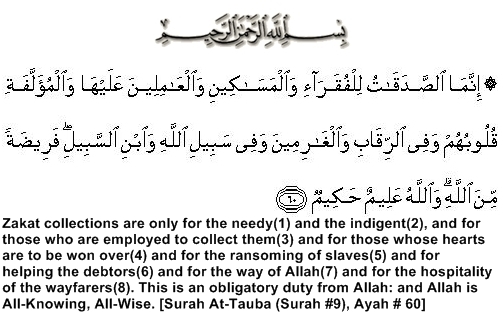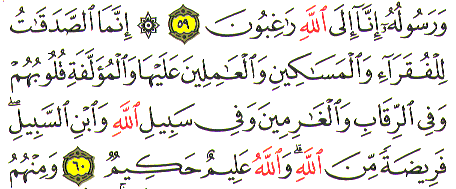Bihar Anjuman believes in self-help rather than charity
Related Items
Quran and Hadith
Useful Articles on Muslim Marriage & Married Life
Abul A'ala Maududi: Towards Understanding Islam
Download: Prophet's Prayer
PEACE TV
SHAREISLAM TV
TARAWEEH TV
ISLAM CHANNEL
Video: Prophet's (PBUH) prayer
Video: Performing Wuzu (Wudhu)
Prophet's (PBUH) Prayer, by Shaikh Muhammad Naasir-ud-Deen Al-Albaani
The Treaty of Hudaibiya
Islamic Art of Living: Presentations
Islamic Art of Living (manners from Quran)
Audios from 163 Islamic Scholars
Islamic Articles
Islamic Personality (Series)
A Guide to Islam for non-Muslims
Mother's Day, Father's Day ... for us it's everyday
Muslims must be MODERATES only
Muslim Marriage Guide
Hajj & Umrah Made Simple (Urdu/ Hindi)
Handbook of Umrah-Hajj
Hajj: Quick Reference Book
Pictorial guide to Hajj Route
The Letter and Spirit of Zakat, by Shakeel Ahmad

Although Yusuf Al-Qaradawi agrees with majority of scholars who interpret "fee sabilillah" as meaning Jihad (disagreeing with some other salafi commentators who are of the view that it includes all religious and secular interests), but he extends the meaning of Jihad to include other forms of Jihad like the intellectual and educational forms which serve to preserve Islamic identity (1)
Part-1: The Letter of Zakat (Zakah)
Zakat is compulsory after the personal wealth crosses a threshold ... we know this.
Zakat is to be given away throughout the year ... as soon as the wealth has crossed the threshold of time ... we know this.
Zakat is to be given only to the poor and destitute individuals ... we know this! Hardly do we know anything if we use ONLY in this sentence! A reference to Surah Tauba (Surah # 9)'s Ayat number 60 in Quran makes sufficiently clear the eight areas in which zakat money should be spent. Well, we know this. Sure, we do.
Zakat purifies our wealth ... we know this, alhamdolillah.

Zakat means "to purify" and also "growth" ... well, it's not a new information for us. Really?
Zakat can be used in a bait-al-maal to render all kinds of service to the masses. This may benefit the poor mostly, but some benefits may actually accrue to the rich as well. To the rich as well? Vow! When Allah commands in the above Quranic verse to spend zakat money on the wayfarer (Travellers who find themselves in difficult circumstances), it is widely believed that He makes no difference between a poor wayfarer and a rich wayfarer (may be rich in his native place, but is currently without nisab).
The literal meaning of zakat is widely understood and consensus is available on many uses despite differences on some of the points. If logic is applied to the reason why Allah made zakat a mandatory feature of a Muslim’s life, most of us believe this could be for taking care of the poor. What if I say it could have been to eradicate poverty? If it was not meant to eradicate poverty but just to feed the poor, thus maintaining the poor in the same conditions as they are, it may be considered by the Munafeqeen as an unfair act of Allah (na’ooz-o-billah), and the claim of Allah that He is the Most Fair and the Most Merciful would be challenged easily. If zakat is not meant to eradicate poverty, then how would this hadeeth come true one day?
Narrated Abu Huraira: The Prophet said, "The Hour (Day of Judgment) will not be established till your wealth increases so much so that one will be worried, for no one will accept his zakat and the person to whom he will give it will reply, 'I am not in need of it.' " (Sahih Bukhari, Book #24, Hadith #493)
Let's ask some simple questions. How many of the eight areas are we using our zakat money for? Should we restrict the use to just a few? If the answer is yes, then what was the need for these eight areas to be mentioned by Allah? Before we discuss the spirit of zakat, the letter of zakat better be clear to us. Are we using zakat to free any slaves. We may immediately rush to say there are no slaves any more. But, behold! Not long back, liberation of bonded labourer groups from the clutches of tyrants was in the news on a daily basis, all over India. Did we hear any Muslim organizations or the use of zakat in these movements? Are we sure there are no bonded labourers (modern slaves) any more?
Are we getting any indebted persons rid of the debt burden? May be at individual levels, there are some isolated cases, but are there any concerted efforts? Every now and then, we hear cases of people taking loans from local sharks and Shylocks to get their daughters married off or to get their sons admitted into colleges, or to get looted by clinics and hospitals. If the debtor is in a difficulty, grant him time Till it is easy for him to repay. But if ye remit it by way of charity, that is best for you if ye only knew. [Quran, 2: 280]
Well, what about the meaning "growth"? Is zakat helping the community towards this end? Can we start thinking in this direction?
Are we using it for any form of Jihad? Well, today, fighting against enemies of Islam means Jihad-an-nafs (fighting against our own ego), the struggle to strengthen our inner selves or conscience - to purify, commit, motivate ourselves to perform better than others, generate resources and build capabilities that can prepare us for any war imposed on us.
And by Nafs, and Him Who perfected him in proportion; Then He showed him what is wrong for him and what is right for him; Indeed he succeeds who purifies his ownself. And indeed he fails who corrupts his ownself. [Quran, 91: 7-10] >> But the Unbelievers (are steeped) in self-glory and Separatism. [Quran 38:2] >> And no one will be granted such goodness except those who exercise patience and self-restraint,- none but persons of the greatest good fortune. [Quran, 41: 35] >> Those who spend their wealth for increase in self-purification, And have in their minds no favour from anyone for which a reward is expected in return, But only the desire to seek for the Countenance of their Lord Most High; And soon will they attain (complete) satisfaction. [Quran, 92: 18-21]
Video Explanation of Quran 9:60 (ayah on zakat distribution), in 2 parts (total 13 minutes):
Video: Part-1
Video: Part-2
Part-2: The Spirit of Zakat (Zakah)


Question: According to some critics, the Islamic institution of Zakah is not a positive aspect; rather, this institution help maintain the gap between the poor and the rich and it makes people submit to their conditions and wait for the charities of the rich. Zakah, to them, does not help Muslims improve their conditions and work hard to get a higher standards of living. How do you comment?
Answer: If "Zakah" meant the coins
that are thrown into the extended hands of beggars in the Muslim lands,
it would serve to cement the prestigious position of the super-rich -
that is all.
But as far as
I understand, "Zakah" means much more than that. It is a way of
"purifying", and also a way of "increasing" wealth, i.e the general
economy. Zakah can be the core of the interest-free economy visualized
by Islam. When it is implemented by a society of sincere and dedicated
Muslims who have the will to realize Allah's Laws on Allah's earth, it
becomes a powerful instrument of economic transformation. Professor Shahul Hameed (3)
He grants Hikmah (Wisdom) to whom He pleases, and he, to whom Hikmah (Wisdom) is granted, is indeed granted abundant good. But none remember (will receive admonition) except men of understanding. (Quran, Al-Baqara, Chapter #2, Verse #269)
"Surely in the creation of the heavens and the earth, in the disparity of the night and the day, in the ships that course in the sea with that which benefits people, in the water that Allah sends down from the sky, reviving with it the earth after it was barren, in His spreading in it all kinds of living things, in the changing of the winds and of the subjected clouds between the earth, indeed are Signs for people who have understanding." [2:164]. "For you, Allah subjected the night and the day, and the sun and the moon, and the stars are in subjection to His command. Surely in this are signs for people who understand." [16:12].
Shall we then confine ourselves to the words alone or shall we also delve into the hikmah (wisdom/ larger objective) behind those words (and allow ijtehad to guide Muslims through changing times)? Are we ready to think out-of-the-box and act wisely, making use of the excellent tools (like the brain) that Almighty has equipped us with? How long shall we continue to waste such precious gifts from Allah that were given with a purpose - to be exploited by this preferred race (Quran >> 2:47, 2:122, 45:16)? What use is knowledge that is not exploited to benefit ourselves?
And certainly We have created for hell many of the jinn and the men; they have hearts with which they do not understand, and they have eyes with which they do not see, and they have ears with which they do not hear; they are as cattle, nay, they are in worse errors; these are the heedless ones. [7:179]
No sane person would contest the fact that zakat money is commanded by Allah to be used for Jihad-fee-sabilillah (striving in the way Allah). If we consider Jihad as "fighting for the cause of Allah", that is to spread (or establish) Islam and removing the obstacles in the way of doing so. As each one of us know that today it is not the mere obstacles that hamper any such effort but there is a strategic plan to nip any such thoughts in the bud itself and proactively engage Muslims in acts that do not leave them with any time or energy to even think in this direction. When it comes to a fight, the enemies of Islam have proved beyond any doubt that they have far superior technological prowess. In order to win any war, Muslims will need to be better equipped. If Jihad means "fighting for the cause of Allah", preparing for such a fight and equipping ourselves for such a fight also means "fighting for the cause of Allah".
And make ready against them all you can of power, including steeds of war (tanks, planes, missiles, artillery, etc.) to threaten the enemy of Allah and your enemy, and others besides whom, you may not know but whom Allah does know. And whatever you shall spend in the Cause of Allah shall be repaid unto you, and you shall not be treated unjustly. [Surah # 8, Al-Anfaal: 60]
This means that we will need to match the enemies in all aspects, i.e., (1) in our faith (may come through Jihad an-Nafs and Jihad as-Shaytan), (2) education and knowledge, (3) application of knowledge (technology) and (4) economy, otherwise how can we "make ready" what is needed for Qital (the final form of Jihad: encountering with the enemy upfront). All expenses in building these capabilities would be "fighting for the cause of Allah", as expenses incurred on preparations. First two are primary areas, of course, and the last two are derivatives of the first two. As of today, we may be superior to our enemies in just one aspect, the first one. In all the other three areas, we are nowhere close to our enemies and any talk of winning a fight against them must be wishful thinking, and no more.
Even Allah's support to Momineen seems to be conditional. In Verse 65 of Aurah Anfal (surah #8), Allah promises a 10:1 support to Momineen (one believer will be enough for ten non-believers). In the very next ayah (Verse 66), Allah says one Momin (believer) would be able to take on only two kuffar (non-believers)! Why? Allah puts forward the reason as well. He says momins are not prepared, yet; that's why! Allah urges us to improve ourselves in comparison with the non-believers, in all aspects of life. And all such improvements are rooted deep into our education and training. The real Jihad is to become better, spiritually, morally, physically, economically, technologically, and so on. Let's train ourselves to be better than ten non-believers, and then, Allah will definitely be with us.
|
Use of Zakat
Fee-Sabilillah |
|
From "Towards Understanding the Quran (Tafheem ul Quran)" by Syed Abul A'ala Maududi, Chapter-9, Ayat # 60 [Urdu Print version, Vol-2, Page-208, Note-67] |
|
"The Way of Allah" is a
general term which implies all those good works which please Allah.
That is why some Jurists are of the opinion that Zakat Funds may be
spent on every kind of good work. But the fact is, and the majority of
the earliest Muslim scholars have opined, that here the 'Way of Allah'
stands for Jihad in the Way of Allah, that is, the struggle to
eradicate the systems based on kufr and to establish the Islamic system
in their stead. Therefore the Zakat Fund may be utilised to meet the
expenses of the journeys the people make, or for procuring means of
conveyance, equipment, weapons and other articles needed for Jihad,
irrespective of the fact whether they are so well off or not as to need
any help for personal requirements. Likewise help of a temporary or
permanent nature may also be given to those people who devote the whole
of their time and energies, temporarily or permanently, for this
work |
Therefore, when Yusuf Al Qaradawi extends the meaning of Jihad-fee-sabilillah to include other forms of Jihad like the intellectual and educational forms which serve "to preserve Islamic identity", he cannot be disputed. But, "preserving Islamic identity" is not proactive whereas Jihad has to be proactive. And Jihad-fee-sabilillah in such an extension will then mean "striving towards educational and socio-economic empowerment of Muslims", the vision of Bihar Anjuman. Thus spending zakat money on any project or endeavour that helps fulfill this vision is simply spending on Jihad-fee-sabilillah, or at least on preparing for Jihad-fee-sabilillah, as envisioned by Syed Abul A'ala Maududi (Tafseer-ul-Quran).
Conclusion:
Agreed that priority should go to fuqara and masakeen while distributing zakat money, but if we try to change their situation by making them self-reliant, I don't see why it would be wrong? Agreed that our payment should involve making them own the money (or the tools bought out of it to empower them) and also that this money cannot exceed the nisab, but what's wrong in planning the best use of this money (and providing expertise) with an intention to bring about a worthwhile change in their economic condition (in the long run)?
We may not agree with those who believe that zakat money can be used even for construction of masjids (4), but I do not see any reason why we should not be advocating the use of this money for all the eight areas advocated by Allah, that has been strategically weaved into Bihar Anjuman's projects which strive to empower the poor educationally and economically. I do not discourage Muslims to take care of their poor relatives and neighbours, but in order to achieve a much greater objective of empowering the Muslim masses, they must allocate at least half of their zakat money to projects directed towards this end, so that long term benefits can accrue to the society.
Let's allow our hearts to feel the urgency of pushing ourselves into action. Let's allow our eyes to see a bright future aligned with our vision. Let's allow our minds to be used to translate these feelings into plans. Let's allow our hands and feet to implement these plans into result-oriented actions. Let's all our senses help us monitor, follow up and improve upon continuously. It is high time we broke out of the slumber that has plunged us into stagnancy and allow our senses to be exploited to the full so that we can revert to the dynamism of the golden Islamic era. Let's compete with each other in a race to do good deeds, as commanded by Allah (5:48, 23:61)
Not equal are those of the
believers who sit (at home), except those who are disabled (by injury
or are blind or lame, etc.), and those who strive hard and fight in the
Cause of Allah with their wealth and their lives. Allah has preferred
in grades those who strive hard and fight with their wealth and their
lives above those who sit (at home). Unto each, Allah has promised good
(Paradise), but Allah has preferred those who strive hard and fight,
above those who sit (at home) by a huge reward;
(Quran An-Nisa, Chapter #4, Verse #95)
References and Notes:
1. http://qaradawi.net/arabic/meetings/al-muntada/program-17-1-98.htm. as in http://www.islamonline.net/English/Ramadan/Fiqhi_Issues/Rulings_of_Zakat-ul-Fitr/02.shtml Qardawi quoted some hadiths to explain the broader meaning of Jihad such as the hadith which reads: “Never a Prophet had been sent before me by Allah towards his nation who had not among his people (his) disciples and companions who followed his ways and obeyed his command. Then there came after them their successors who said whatever they did not practice, and practiced whatever they were not commanded to do. He who strove against them with his hand was a believer: he who strove against them with his tongue was a believer, and he who strove against them with his heart was a believer and beyond that there is no faith even to the extent of a mustard seed.” (Reported by Muslim) Then he also said that these forms are also included in Jihad by analogy for both of them are intended to support Islam and defend it against its enemies [Qarad�w�, Y�suf al-, Fat�w� Mu‘�sirah, p. 287]
2. http://www.thezakat.org/Zakat-Center.aspx
3. http://www.islamonline.net/livedialogue/english/Browse.asp?hGuestID=gTH2Rv
4. Some contemporary Muslim scholars hold the view that this category includes all acts that are in interest of the society such as building mosques, schools, hospitals etc., among them are Sheikh ‘Abd al-Halim Mahmud [Mahm�d, op.cit, p.344-46] and Sheikh Hasanayn Muhammad Makhluf [Fat�w� Shar‘iyyah wa Buh�th Islamiyyah, 2nd ed., Matba‘at Mustafa al-B�b� al-Halab�, Egypt, 1385/1965, p. 296]
Shikwa-e-zulmat-e-shab
se to kahin behtar tha;
Apne hissey ki koi shamm'a jalaate jaatey. [Ahmad Faraz]
|
Better light a candle than curse the darkness |
|


